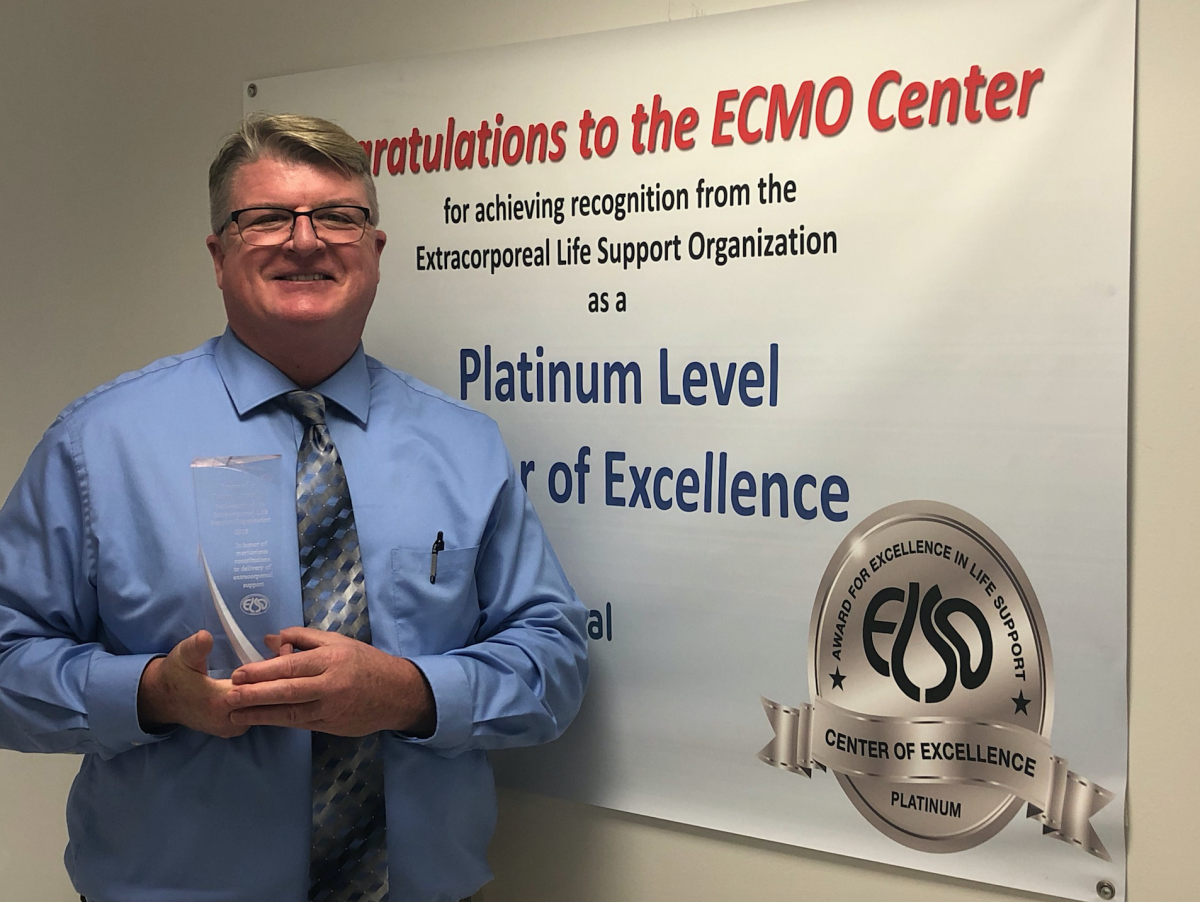HOW CAN WE HELP YOU? Call 1-800-TRY-CHOP
In This Section
Screening Tool for Autism, Recognition of ECMO Center Manager, Generous Gift for Palliative Care, Research Leadership Position, Non-verbal Children with Autism
 Take a look at who’s been making research headlines lately. This week we’re covering the accuracy of an autism spectrum disorder screening tool; the generous gift for palliative care, treatment, and research; and the international recognition of our Extracorporeal Membrane Oxygenation (ECMO) Center manager, James Connelly.
Take a look at who’s been making research headlines lately. This week we’re covering the accuracy of an autism spectrum disorder screening tool; the generous gift for palliative care, treatment, and research; and the international recognition of our Extracorporeal Membrane Oxygenation (ECMO) Center manager, James Connelly.
Most Widely Used Screening Tool for Autism Spectrum Disorder: Is it Accurate?
In the first large, real-world study of universal screening for autism spectrum disorder (ASD) in toddlers, researchers at Children’s Hospital of Philadelphia found that the Modified Checklist for Autism in Toddlers with Follow-Up (M-CHAT/F) — the most widely used and researched ASD screening tool — is less accurate than shown in previous studies conducted in research laboratory settings. The new study also revealed significant disparities in detecting early autism symptoms in minority, urban, and low-income children. The findings appeared online in the journal Pediatrics.
“Although our findings reveal significant shortcomings in current screening tools, we want to be clear that we are not recommending that pediatricians stop universal screening,” said lead author Whitney Guthrie, PhD, a clinical psychologist specializing in early diagnosis at CHOP’s Center for Autism Research.
“Instead, clinicians should continue to screen using the M-CHAT/F, while being aware that this screening tool does miss some children with ASD,” Dr. Guthrie said. “Any clinical or parental concerns should be taken seriously, and warrant continued surveillance even if a child screens negative on the M-CHAT/F. And of course, a screen positive on the M-CHAT/F warrants referral so that children with ASD can be diagnosed and receive early intervention.”
Go to CHOP News to learn more about this revealing study.
ECMO Center Manager Awarded Prestigious Fellowship
 We’d like to give a big shout out to James Connelly, RRT-NPS, manager of CHOP’s Extracorporeal Membrane Oxygenation (ECMO) Center. Connelly received the Fellowship of the Extracorporeal Life Support Organization (ELSO) — giving recognition to his extraordinary contributions to the science of ECMO, an advanced life support technique used for patients with life-threatening heart and/or lung problems. ECMO provides long-term breathing and heart support and is used only when all of the standard treatments for those problems have already been tried. A highly specialized treatment, ECMO can support patients for days to weeks while doctors treat their underlying illness.
We’d like to give a big shout out to James Connelly, RRT-NPS, manager of CHOP’s Extracorporeal Membrane Oxygenation (ECMO) Center. Connelly received the Fellowship of the Extracorporeal Life Support Organization (ELSO) — giving recognition to his extraordinary contributions to the science of ECMO, an advanced life support technique used for patients with life-threatening heart and/or lung problems. ECMO provides long-term breathing and heart support and is used only when all of the standard treatments for those problems have already been tried. A highly specialized treatment, ECMO can support patients for days to weeks while doctors treat their underlying illness.
“Every program/center at CHOP has a heartbeat, someone who defines the work, sets a pace, establishes a rhythm, and supports the soul of the program,” said Todd Kilbaugh, MD, medical director of the ECMO Center. “Jim has been the heartbeat of the ECMO program from the beginning, and a driving force in our international reputation and Platinum Center of Excellence. His superior knowledge and continual commitment to patients, families, and providers is unrivaled.”
Only a handful of people are elected internationally to be a fellow of ELSO, Dr. Kilbaugh noted, and fewer than 10 are non-physicians worldwide. Connelly is the first respiratory therapist to ever be elected.
“Jim Connelly is the ECMO center, and his well-earned award is an honor that we as a Center will cherish and revel in, together, because he has led the way,” Dr. Kilbaugh said.
Generous Gift Enables CHOP to Expand Palliative Care Program and Research
The opening of CHOP’s Justin Michael Ingerman Center for Palliative Care, made possible by a $3 million donation from by the Justin Ingerman Foundation, will help launch the next generation of services and care for CHOP’s internationally recognized palliative care program: Pediatric Advanced Care Team (PACT).
The generous funding from the Ingerman family not only helps PACT deliver care to relieve pain and stress for patients and provide emotional, social, spiritual, and bereavement support for families, but also enables the PACT team to conduct research. For example, the funding helps support studies on the symptoms experienced by children with serious illness so symptom management can be improved, on the physical and psychological well-being of parents and siblings so better support can be provided, and on aspects of how these children are cared for in hospitals to enhance the ways that palliative care teams can serve these children and families. The funding enables PACT to provide leadership to nationwide and international research collaborations.
“Invaluable — that sums up the importance of the Justin Ingerman Foundation to our ability to sustain our pediatric palliative care research program,” said Chris Feudtner, MD, PhD, MPH, director of Research for PACT. “With this funding, we are able to pursue some of the most important and often difficult questions and advance not only our understanding but also our practical abilities to improve care for patients and families. Simply invaluable.”
Go to CHOP News for more information.
New Research Leadership Role for Physician Scientist Brian Fisher
 Clinical Futures, a Research Institute Center of Emphasis, announced Brian Fisher, DO, MSCE, has been appointed associate chair for Research in the Department of Pediatrics.
Clinical Futures, a Research Institute Center of Emphasis, announced Brian Fisher, DO, MSCE, has been appointed associate chair for Research in the Department of Pediatrics.
Dr. Fisher, director of the Pediatric Infectious Diseases Fellowship Training Program and associate professor of Pediatrics and Epidemiology in the Perelman School of Medicine at the University of Pennsylvania, focuses his research program on the epidemiology, diagnosis, and management of infectious complications in immunocompromised children, with particular emphasis on children with cancer and fungal infections.
In his new position, he will oversee recruitment of research-oriented faculty, development of recruitment packages for research-oriented faculty, and assignment of research space, working closely with leaders of the Research Institute. He’ll have a critical role in facilitating research activity in the Department of Pediatrics and supporting achievement of the Division-based research strategic plans.
Dr. Fisher will also provide oversight for the mentoring program for research-oriented faculty, refining and strengthening this program. And, he will assume responsibility for co-chairing the Department Research Advisory Committee and co-chairing the Department Faculty Advising Program.
“Please join me in congratulating Brian on his new responsibilities,” Joseph St. Geme, MD, physician-in-chief and chair of the Department of Pediatrics, said in the announcement. “I know he will be successful in facilitating the continued success of the research enterprise in the Department of Pediatrics, and I look forward to working with him in this capacity.”
Study Finds Slower Response to Sounds by Nonverbal Children With Autism
Even though nonverbal or minimally verbal people who have autism spectrum disorder (ASD) make up between 25 and 30 percent of the total autistic population, almost no studies have been done focusing on this group and their particular needs.
Addressing this gap, researchers at CHOP’s Intellectual and Developmental Disabilities Research Center used state-of-the-art brain imaging, magnetoencephalography (MEG) technology, to show brain functions in this difficult-to-study population, which could have important diagnostic and prognostic implications across the autism spectrum. The researchers found that minimally verbal or nonverbal participants had delayed responses to simple auditory tones, and longer times to response were associated with poorer communication skills as measured by a standardized questionnaire completed by parents.
“Given their association with language activity, we believe these measurements of response time have both prognostic and treatment ramifications,” said coauthor Emily Kuschner, PhD, licensed clinical psychologist and scientist in the Lurie Family Foundations Magnetoencephalography (MEG) Center and the Center for Autism Research at CHOP. “It would be exciting if down the road we could use these MEG markers to understand the course of language development or personalize which treatment approach might be best for a particular child.”
Learn more at CHOP News. The findings appeared in the journal Molecular Autism.
ICYMI
Catch up on our headlines from our Sept. 20 In the News:
- Pilot Study Explores Kidney Pre-transplant Evaluation and Communication
- Working Memory Development and Teen Crashes
- CHOP Scientists Identify Gene as a Master Regulator in Schizophrenia
- Female Athletes Delay Specialty Care Following Concussion
- Hao Huang, PhD, is Lead Editor of Special Issue of NeuroImage
That’s it for this briefing! Keep up with our news, stories, and updates in real time by following us on Twitter, Facebook, LinkedIn, or Instagram. Or subscribe to our newsletter to get an email sent every other Friday by signing up for Cornerstone.


